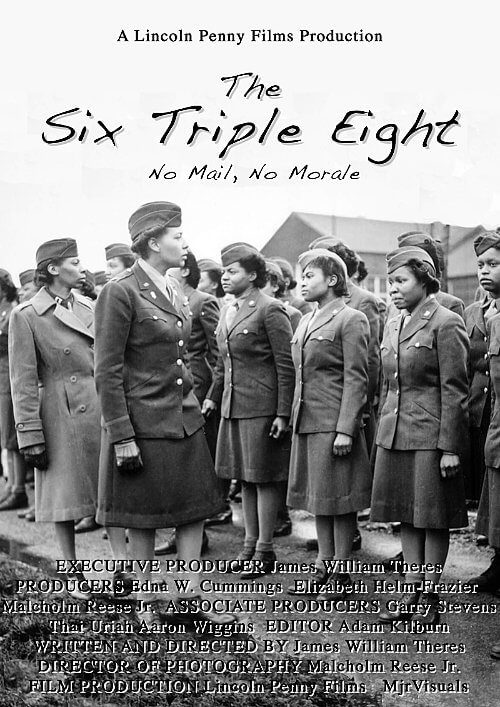
Join us on Saturday, September 16 at 7:00pm ET (4pm PT) to mark National 6888th Central Postal Directory Battalion Day with a screening of the documentary The Six Triple Eight, followed by a conversation with filmmakers James Theres and Elizabeth Anne Helm-Frazier.
Until ten years ago, few Americans had ever heard of the 6888th Central Postal Directory Battalion, the only all-African American, all-female unit that served overseas during World War II.
Now, after James Theres’ documentary, countless news articles, a Congressional Gold Medal, and a soon-to-be-released Tyler Perry-directed feature movie, Six Triple Eight, the story of the 855 women sent to England and France to untangle a two-year backlog of undelivered GI mail is known and celebrated nationwide.
We have Elizabeth Anne Helm-Frazier to thank for bringing this previously unheralded Women’s Army Corps unit to public awareness. Along with retired Army Colonel Edna Cummings, Elizabeth has worked for years to honor a generation of pioneering soldiers who blazed a trail for the women of color who followed.
The 6888th Battalion was born of crisis in February 1945. Seven million pieces of US mail destined for eight million GIs in Europe were stacked to the ceilings in British and French warehouses.
In the context of global war, undelivered letters and parcels don’t, at first glance, rank as urgent problems. But for American troops, mail call was a lifeline, the only connection to home, and the most important factor for maintaining morale.
Commanded by Major Charity Adams, the first Black woman officer in the Army WACs, the 6888th Battalion served in a strictly segregated US Army, where facilities were separate and unequal. The women took on their mission with inadequate resources and little equipment. All they had was the determination and ingenuity to categorize, sort, and redirect mail to its intended recipients.
The battalion sorted 65,000 pieces of mail, on average, each shift, a number made more remarkable considering many envelopes had indecipherable addresses or simply read “Robert Smith, US Army, ETO.” Which of the 7,500 Robert Smiths in Europe was supposed to get this letter?

In many cases, the only solution was to open the mail, read the letter, and search for identifying information, such as hometown newspapers or local addresses, to determine the correct recipients. In such a way, the women of the “Six Triple Eight” cleared the backlog in Britain in three months. In France, with the aid of civilians and German POWs, they dispatched an even larger mountain of mail in less than six.
Veterans of the 6888th Battalion returned home to a country still dominated by Jim Crow. In 1942, the nation’s largest black newspaper, The Pittsburgh Courier, had called upon readers to embrace a “Double V” campaign for democracy and freedom at home and abroad. This challenge to racial segregation would only bear fruit in the decades following World War II, as the modern Civil Rights Movement took hold.
But the memory of Charity Adams and her WAC soldiers would endure as inspiration for future generations of Black women soldiers, like Elizabeth, who now honor their predecessors by sharing their story.
You can join our film screening and conversation on September 16 by going to veteransbreakfastclub.org/events.


